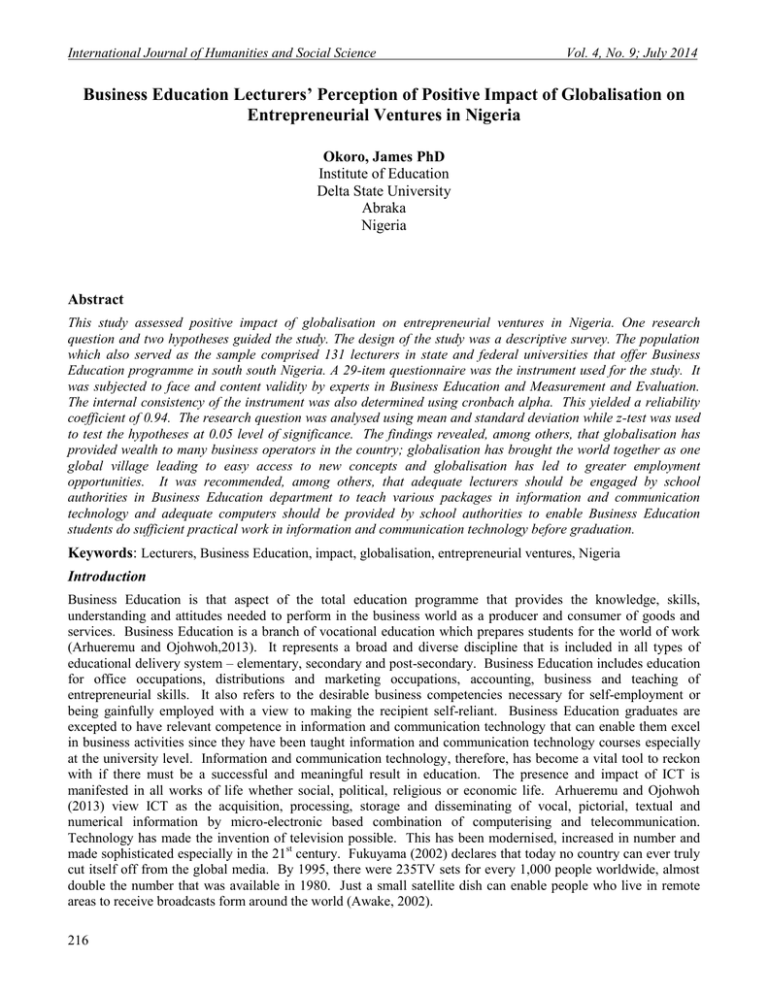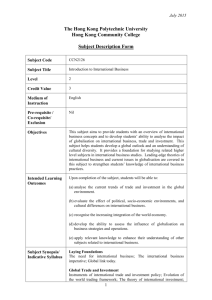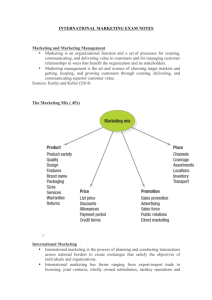Document 10465884
advertisement

International Journal of Humanities and Social Science Vol. 4, No. 9; July 2014 Business Education Lecturers’ Perception of Positive Impact of Globalisation on Entrepreneurial Ventures in Nigeria Okoro, James PhD Institute of Education Delta State University Abraka Nigeria Abstract This study assessed positive impact of globalisation on entrepreneurial ventures in Nigeria. One research question and two hypotheses guided the study. The design of the study was a descriptive survey. The population which also served as the sample comprised 131 lecturers in state and federal universities that offer Business Education programme in south south Nigeria. A 29-item questionnaire was the instrument used for the study. It was subjected to face and content validity by experts in Business Education and Measurement and Evaluation. The internal consistency of the instrument was also determined using cronbach alpha. This yielded a reliability coefficient of 0.94. The research question was analysed using mean and standard deviation while z-test was used to test the hypotheses at 0.05 level of significance. The findings revealed, among others, that globalisation has provided wealth to many business operators in the country; globalisation has brought the world together as one global village leading to easy access to new concepts and globalisation has led to greater employment opportunities. It was recommended, among others, that adequate lecturers should be engaged by school authorities in Business Education department to teach various packages in information and communication technology and adequate computers should be provided by school authorities to enable Business Education students do sufficient practical work in information and communication technology before graduation. Keywords: Lecturers, Business Education, impact, globalisation, entrepreneurial ventures, Nigeria Introduction Business Education is that aspect of the total education programme that provides the knowledge, skills, understanding and attitudes needed to perform in the business world as a producer and consumer of goods and services. Business Education is a branch of vocational education which prepares students for the world of work (Arhueremu and Ojohwoh,2013). It represents a broad and diverse discipline that is included in all types of educational delivery system – elementary, secondary and post-secondary. Business Education includes education for office occupations, distributions and marketing occupations, accounting, business and teaching of entrepreneurial skills. It also refers to the desirable business competencies necessary for self-employment or being gainfully employed with a view to making the recipient self-reliant. Business Education graduates are excepted to have relevant competence in information and communication technology that can enable them excel in business activities since they have been taught information and communication technology courses especially at the university level. Information and communication technology, therefore, has become a vital tool to reckon with if there must be a successful and meaningful result in education. The presence and impact of ICT is manifested in all works of life whether social, political, religious or economic life. Arhueremu and Ojohwoh (2013) view ICT as the acquisition, processing, storage and disseminating of vocal, pictorial, textual and numerical information by micro-electronic based combination of computerising and telecommunication. Technology has made the invention of television possible. This has been modernised, increased in number and made sophisticated especially in the 21st century. Fukuyama (2002) declares that today no country can ever truly cut itself off from the global media. By 1995, there were 235TV sets for every 1,000 people worldwide, almost double the number that was available in 1980. Just a small satellite dish can enable people who live in remote areas to receive broadcasts form around the world (Awake, 2002). 216 © Center for Promoting Ideas, USA www.ijhssnet.com Friedman (2002) reports that an estimate of 300,000 new users get connected to the internet while about 700 million people came on line by 2001.Similarly, telephone network has increased and has become cheaper than it had been some years back. It is clear today that about one billion people are using mobile phones worldwide. Very importantly too, is the work of microchip. The computing power of microchip has become very useful and it has been brought to the reach of many people making possible the storing of so much information in a little space (Osaat, 2004).The advanced application of ICT in the business world has actualised the concept of globalisation. Globalisation is simply the description of the growing worldwide interdependence of tribes, people, countries and regional affiliations aided by the advent of advanced technology (Osaat, 2004). According to Adesanya (2001), globalisation is “the process by which enterprises related or unrelated become interdependent and inter-linked globally through strategic alliances and international networks.” The United Nations Human Development Report (1999) sees globalisation as how “people’s lives around the globe are linked more deeply, more intensely, more immediately than ever before” (Awake, 2002). Ayonmike (2009) states that globalisation brings in changes, perhaps too quickly and too profound. It is the most potent force for transforming whole communities, countries or regions from primordial backwardness to modernity. The United Nations’ Today (2008) posits that globalisation aims at accelerating development in the area of agriculture, trade, economy, politics, science and technology. It is also seen as a catalyst in the area of positive development of the world’s economy and technology with particular emphasis on the emerging nations. Globalisation is a process of interacting among the people, companies, and governments of different nations. It is a process driven by international trade and investment and aided by information technology. Friedman (2005) opines that globalisation in its literal sense is the process of transformation of local or regional phenomena into global ones. It can be described as a process by which the people of the world are unified into a single society and function together (Agbamu&Ukor, 2009). Globalisation is a product of information technology and the two concepts are inseparable, having made great impact in transforming the world economic environment. While globalisation is viewed in terms of global economic policy direction, information technology is the machinery through which this world economic policy is transmitted. Globalisation is also defined by Asuquo (2012) as a process where national markets are becoming increasingly interlinked, where the interdependence of production is intensified, and where the mechanism deciding the allocation in goods and factor markets is increasingly operating at a global level. Monsod (2000) also describes globalisation as the widening and deepening of international flow of trade, finance, and information in a single integrated global market. Globalisation, therefore, is the transformation of the world into a global village leading to the disappearance of boarders, shrinking of distances and shortening of time. The impact of globalisation and information technology in the positive growth of an economy cannot be underrated. Jones (2006) observes that foreign direct investment (FDI) has had a tremendous influence on the world economy in recent times as a result of globalisation. Since FDI is the product of globalisation, it has brought into many countries, especially developing countries, new technologies, managerial experience and training leading to rise in entrepreneurial activities. Similarly, Kouschning and Nelson (2002) maintain that since capital accessibility is seen as one of the top start-up difficulties, raising external capital input may satisfy the entrepreneurial sector’s need for start-up financing in a country. Okebukola (1995) opines that globalisation has stimulated a new thrust into our vision and actions as it brings us into active competition with other nations of the global village. If globalisation and information technology are important tools for stimulating entrepreneurship, what is the level of performance of entrepreneurial activities in Nigeria? Entrepreneurship is the willingness and ability of an individual to seek out investment opportunities, establish and run an enterprise successfully. The entrepreneur is a person who owns and manages a business through which income is gained (Abdulkadir, 2011). The National Directorate for Employment defines entrepreneurship as the art which involves recognising a business opportunity, mobilising resources and continuously exploiting that opportunity. The sole idea of entrepreneurship is achieved when the entrepreneur takes risk which is energised by inner drive and the ability to develop a new venture and apply a new approach to old businesses. Entrepreneurship, according to Kuratko (2003),is a dynamic process of vision, change and creation. It requires application of energy and passion towards the creation and implication of new ideas and creative solutions. 217 International Journal of Humanities and Social Science Vol. 4, No. 9; July 2014 Kuratko (2003) further maintains that the essential ingredients for entrepreneurship include the willingness to take calculated risk in terms of time, equity, or career; the ability to formulate an effective venture team; the creative skills to enhance the needed resources; the fundamental skill of building solid business plan; and finally, the vision to recognise opportunity where others see chaos, contradiction and confusion. Odu (2009) notes that entrepreneurship is “making a living by working for yourself.” Entrepreneurship, therefore, involves the ability to set up a business as different from being employed. Entrepreneurship education deals with the skills of business ownership and management. The characteristics of seeking opportunities, taking risk beyond security and having the tenacity to push an idea through to reality, combine into a special perspective that permeates entrepreneurs (Asuquo, 2012). Asuquo (2012) also looks at entrepreneurship in terms of the Schumpeter’s theory. Theory describes entrepreneurship as a process of bringing about changes, technological possibilities, altering conventions through innovative activity and, hence, removing production constraints. Asuquo (2012) points out some impacts of globalisation such as globalisation has brought the world together as one global village leading to easy access to new concepts and ideas in business and entrepreneurship; globalisation and information technology have led to greater employment opportunities and wealth creation, in the country; globalisation and information technology have opened up the Nigerian economy resulting in lower barriers to trade and investment in the country; globalisation has also led to additional external financing for developing the small and medium scale sector of the economy. Unfortunately, the teaching of ICT and globalisation in tertiary institutions in Nigeria is characterised by inadequate funding, inadequate equipment and facilities and inadequate qualified lecturers to handle sophisticated components of ICT such as internet and intranet connectivity that could lead to globalisation. These constraints have negatively affected the acquisition of relevant competences and skills by Business Education graduates to function effectively in setting up businesses and run them without failure. Statement of the Problem No nation can survive without business. Therefore, nations enter into business with other countries of the world because all the goods needed by a particular country to satisfy the needs of the country cannot be found within the country alone. For instance, Nigeria produces oil but does not produce some other goods and services needed by its members (Nwoka, 2009). Acquisition of knowledge of globalisation can help in interconnectivity of businesses. Realisation of the impact of globalisation and ICT can be frustrated if adequate facilities and adequate lecturers are not provided in tertiary institutions for ICT. The problem of the study, therefore, is what is the positive impact of globalisation and ICT on entrepreneurial ventures in Nigeria? Purpose of the Study The purpose of the study is to assess the positive impact of globalisation on entrepreneurial ventures in Nigeria. Research Question The following research question guided the study. What is the positive impact of globalisation on entrepreneurial ventures in Nigeria as perceived by Business Education lecturers in universities? Hypotheses The following hypotheses were tested at 0.05 level of significance 1. There is no significant difference between male and female Business Education lecturers mean rating of positive impact of globalisation on entrepreneurial ventures in Nigeria. 2. There is no significant difference between state and federal universities Business Education lecturers mean rating of positive impact of globalisation on entrepreneurial ventures in Nigeria. Method This study adopted a descriptive survey design. The population of the study comprised 131 Business Education lecturers in state and federal universities in south south geopolitical zone of Nigeria. There was no sampling since the population in the zone was manageable. The instrument for data collection was a 29 – item questionnaire. It had two sections. Section A of the questionnaire had 3 items on demographic variables of the respondents (sex, university type, teaching experience). Section B had 26 items based on the research question. The questionnaire had a four point scale of Strongly Agree (SA), Agree (A), Disagree (D) and Strongly Disagree (SD). 218 © Center for Promoting Ideas, USA www.ijhssnet.com The content and face validity of the instrument was carried out by four experts in Business Education and two experts in Measurement and Evaluation. The instrument was also validated using factor analysis. In order to carry out the reliability of the instrument, the questionnaire was administered to 32 Business Education lecturers in South East universities of Nigeria, an area which was not part of the study. The data collected were analysed and the internal consistency of the instrument was determined using cronbach alpha, which has a reliability coefficient of 0.94. The data were analysed using mean and standard deviation to answer the research question. In analysing the data, the response options in the questionnaire were weighted as follows: Strongly Agree – 4points, Agree – 3points, Disagree – 2points, Strongly Disagree – 1point. A cut-off point of 2.50 was set to agree or disagree items on the instrument. Mean score above 2.50 shows agreed, while mean score less than 2.50 shows disagreed. Z-test was used to test the hypotheses at 0.05 level of significance. If the calculated value (cv) is less than table value (tv) 1.96, the hypothesis is retained. On the other hand, if z-calculated (zc) is above table value (tv), the hypothesis is rejected. Result Research Question: What is the positive impact of globalisation on entrepreneurial ventures in Nigeria as perceived by Business Education lecturers in universities? Table 1: Mean Ratings and SD of the Respondents on the Impact of Globalisation on Entrepreneurial Ventures in Nigeria. (N = 131) S/N 1 2 3 4 5 6 7 8 9 10 11 Positive impact of globalisation on entrepreneurial ventures Globalisation has provided wealth to many business operators in the country Globalisation has brought the world together as one global village leading to easy access to new concepts Globalisation has led to greater employment opportunities Globalisation has opened up the Nigerian economy resulting in lower barriers to trade in the country Globalisation has led to additional external financing for developing the small and medium scale sector of the economy Globalisation has stimulated active competition in trade Globalisation has stimulated active competition in industries Globalisation has increased government’s political will to tackle unemployment through various interventions in entrepreneurship education Globalisation has increased government’s political will to tackle poverty through various interventions in entrepreneurship education Globalisation has helped entrepreneurs to visualise common challenges to their businesses through closer linkages for better performance Globalisation has presented viable opportunities for information sharing among entrepreneurs within Nigeria Mean SD Remark 2.89 0.86 Agreed 2.79 0.91 Agreed 2.71 0.94 Agreed 2.80 0.89 Agreed 2.82 0.78 Agreed 2.90 0.89 Agreed 2.84 0.82 Agreed 2.70 0.96 Agreed 2.69 0.86 Agreed 2.73 0.85 Agreed 2.98 0.91 Agreed 219 International Journal of Humanities and Social Science 12 13 14 15 16 17 18 19 20 21 22 23 24 25 26 220 for better performance Globalisation has presented viable opportunities for information sharing among entrepreneurs outside Nigeria for better performance Globalisation has engendered productivity of entrepreneurs in the country Globalisation has widened the scope of skills in the art of doing business among entrepreneurs Globalisation has widened the scope of competences in the art of doing business among entrepreneurs Access to capital has been made easier to entrepreneurs through globalisation Globalisation has minimised overconcentration of business in urban areas thus opening up entrepreneurial development in rural areas The running cost of doing business has been minimised through globalisation due to reduced travelling needs The running cost of doing business has been minimised through globalisation due to reduced communication needs Globalisation has reinforced global interest in creating export opportunities in developing countries Globalisation has reinforced global interest in creating export opportunities in encouraging indigenous manufacturing Time challenges have been minimised in business transactions among entrepreneurs due to the emergence of globalisation Space challenges have been minimised in business transactions among entrepreneurs due to the emergence of globalisation There have been a wide range of training opportunities in Nigeria for entrepreneurial development as a result of globalisation There have been a wide range of retraining opportunities in Nigeria for entrepreneurial development as a result of globalisation Globalisation has aided learning among students of Business Education as a necessary factor for taking up entrepreneurship opportunities after graduation Grand mean Vol. 4, No. 9; July 2014 2.79 0.86 Agreed 2.82 0.75 Agreed 2.95 0.69 Agreed 2.77 0.83 Agreed 2.69 0.58 Agreed 2.87 0.79 Agreed 2.83 0.78 Agreed 2.79 0.91 Agreed 2.75 0.87 Agreed 2.78 0.79 Agreed 2.68 0.71 Agreed 2.87 0.85 Agreed 2.88 0.79 Agreed 2.64 0.88 Agreed 2.94 0.89 Agreed 2.80 0.83 Agreed © Center for Promoting Ideas, USA www.ijhssnet.com Table 1 contains twenty-six (26) items of positive impact of globalisation on entrepreneurial ventures in Nigeria. All the items have positive impact of globalisation on entrepreneurial ventures in Nigeria. The mean ranges from 2.64-2.98. The grand mean of 2.80 further confirms that globalisation has positive impact on entrepreneurial ventures in Nigeria. Hypothesis1 There is no significant difference between male and female Business Education lecturers mean rating of positive impact of globalisation on entrepreneurial ventures in Nigeria. Table 2: Z-Test Result of the Difference on Respondents’ Mean Rating of Positive Impact of Globalisation on Entrepreneurial Ventures in Nigeria (N= 129) Variables Male Female N 78 53 Mean 36.82 35.54 SD 10.46 Df Z-cal Z-tab Remarks 129 1.22 1.960 NS 10.30 In the table, the calculated z-value of 1.22 is less than the z-tabulated value of 1.960 at 129 degree of freedom at 0.05 level of significance. This means that there was no significant difference in the mean rating of male and female respondents on assessment of positive impact of globalisation on entrepreneurial ventures in Nigeria. Hypothesis 2 There is no significant difference between state and federal universities Business Education lecturers mean rating of positive impact of globalisation on entrepreneurial ventures in Nigeria. Table 3: Z-Test Result of the Difference on Respondents’ Mean Rating of Positive Impact of Globalisation on Entrepreneurial Ventures in Nigeria Variables State universities lecturers Federal universities lecturers N Mean SD 79 34.68 11.04 52 32.77 Df Z-cal Z-tab Remarks 129 1.27 1.960 NS 11.88 In the table, the calculated z-value of 1.27 is less than the z-tabulated value of 1.960 at 129 degree of freedom at 0.05 level of significance. This means that there was no significant difference in the mean rating of state and federal universities lecturers (respondents) on assessment of positive impact of globalisation on entrepreneurial ventures in Nigeria. Discussion The study revealed that globalisation has provided wealth to many business operators in the country; globalisation has brought the world together as one global village leading to easy access to new concepts; globalisation has led to greater employment opportunities; globalisation has opened up the Nigerian economy resulting in lower barriers to trade in the country; globalisation has led to additional external financing for developing the small and medium scale sector of the economy; globalisation has stimulated active competition in trade; globalisation has stimulated active competition in industries; globalisation has increased government’s political will to tackle unemployment through various interventions in entrepreneurship education; globalisation has increased government’s political will to tackle poverty through various interventions in entrepreneurship education, globalisation has helped entrepreneurs to visualise common challenges to their businesses through closer linkages for better performance; globalisation has presented viable opportunities for information sharing among entrepreneurs within Nigeria for better performance; globalisation has presented viable opportunities for information sharing among entrepreneurs outside Nigeria for better performance, globalisation has engendered productivity of entrepreneurs in the country; globalisation has widened the scope of skills in the art of doing business among entrepreneurs and globalisation has widened the scope of competences in the art of doing business among entrepreneurs. 221 International Journal of Humanities and Social Science Vol. 4, No. 9; July 2014 Access to capital has been made easier to entrepreneurs through globalisation; globalisation has minimised overconcentration of business in urban areas thus opening up entrepreneurial development in rural areas; the running cost of doing business has been minimised through globalisation due to reduced travelling needs, the running cost of doing business has been minimised through globalisation due to reduced communication needs; globalisation has reinforced global interest in creating export opportunities in developing countries; globalisation has reinforced global interest in creating export opportunities to encourage indigenous manufacturing; time challenges have been minimised in business transactions among entrepreneurs due to the emergence of globalisation; space challenges has been minimised in business transactions among entrepreneurs due to the emergence of globalisation; there have been a wide range of training opportunities in Nigeria for entrepreneurial development as a result of globalisation; globalisation has aided learning among students of Business Education as a necessary factor for taking up entrepreneurship opportunities after graduation. This study is consistent with earlier studies of Osaat (2004), Ayonmike (2009), Agbamu and Ukor (2009) and Asuquo (2012) who earlier identified similar positive impacts of globalisation on entrepreneurial ventures. The result of the hypotheses also revealed that there is no significant difference between male and female Business Education lecturers mean rating of positive impact of globalisation on entrepreneurial ventures in Nigeria and there is no significant difference between state and federal universities Business Education lecturers mean rating of positive impact of globalisation on entrepreneurial ventures in Nigeria. Conclusion A nation that desires to have technological advancement, should give attention to the role globalisation plays in the enhancement of Business Education. Globalisation being an advanced technology aims to bring together nations, continents, individuals, institutions, religious and economic groups as a whole for global unity, growth and stability. It is a system of technological advancement in information and communication technology among nations without impediments. Globalisation is a blessing to Business Education graduates on entrepreneurial development in Nigeria. Recommendations The following recommendations are made based on the findings. 1. Adequate lecturers should be engaged by school authorities in Business Education department to teach various packages in information and communication technology. 2. Adequate computers should be provided by school authorities to enable Business Education students do sufficient practical work in information and communication technology before graduation. 3. Both government and entrepreneurs should explore all the opportunities offered by globalisation and information technology to facilitate the environment of entrepreneurship in the country. 4. Government should demonstrate more political will in encouraging indigenous entrepreneurs by collapsing the constraints against easy access to capital for entrepreneurial activity. 222 © Center for Promoting Ideas, USA www.ijhssnet.com References Abdulkadir, A.A. (2011). The role of entrepreneurship education in empowering Nigerian youths. Business Education Journal. 8(1), 14-22. Adesanya, L. A. (2001). Examination of the nexus between adult education and globalisation. Nigerian Journal of Educational Philosophy. 8(1), 28-37. Agbamu, T.P. & Ukor, L.O. (2009). Insurance practice in Nigeria: Issues, challenges and strategies. Delta Business Education Journal.1(5).59-65. Arhueremu, V.M. & Ojohwoh R. (2013). Quality teaching method of ICT skills: Implications for business educators. Books of Readings. 3(1), 105-110. Asuquo, E.E. (2012). Impact of globalisation and information technology on the development of entrepreneurship in Nigeria. Business Education Journal. 8(2), 83-98. Ayonmike, S.C. (2009). Globalisation and its impact on technology education. Delta Business Education Journal. 1(5), 130-139. Friedman, T. (2002) in Awake, May 22. Fukuyama, O. (2002) in Awake, May 22. Jones, K. (1006). Entrepreneurship in the global economy. In minniti, M. (ed) Entrepreneurship: The engine of Growth. USA praogor press. Kouschinigg, C. and Nelson, S.B. (2002).Tax policy, venture capital and entrepreneurship. Journal of Pubic Economic.8(7). 32-38 Kuratko, D.F. (2003). Entrepreneurship education: emerging trends and challenges for the 21st century. 2003 Coleman Foundation white paper series for the U.S. Association of small business entrepreneurship. Monsod, S. (2000).Globalisation: challenges and opportunities downloaded from www.capwip.org/resoruces/compalconf200/..00monsod1.pdf. Odu, K.O. (2009). Poverty alleviation and entrepreneurship education: challenges in the face of global economic crises in Nigeria. Delta Business Education Journal. 1(5), 155-162. Okebukola, S.O. (1995). Office technology: the curricular implications. London. Osaat, S.D. (2004). Globalisation: The concept, controversies and issues. African Journal of Education and development studies. 1(1), 40-47. The United Nations Today (2008). New York. 223





